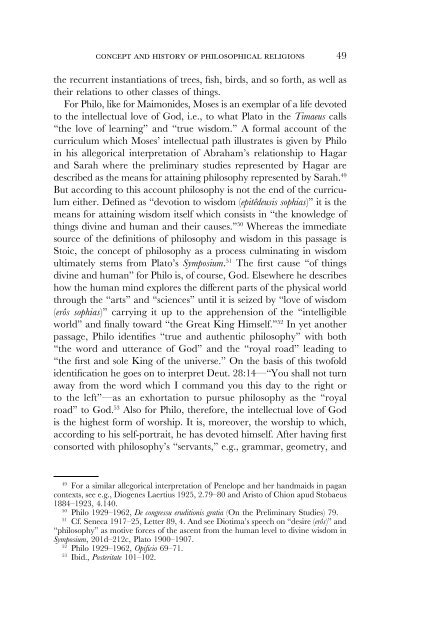Download PDF - Carlos F. Fraenkel
Download PDF - Carlos F. Fraenkel
Download PDF - Carlos F. Fraenkel
Create successful ePaper yourself
Turn your PDF publications into a flip-book with our unique Google optimized e-Paper software.
concept and history of philosophical religions 49the recurrent instantiations of trees, fish, birds, and so forth, as well astheir relations to other classes of things.For Philo, like for Maimonides, Moses is an exemplar of a life devotedto the intellectual love of God, i.e., to what Plato in the Timaeus calls“the love of learning” and “true wisdom.” A formal account of thecurriculum which Moses’ intellectual path illustrates is given by Philoin his allegorical interpretation of Abraham’s relationship to Hagarand Sarah where the preliminary studies represented by Hagar aredescribed as the means for attaining philosophy represented by Sarah. 49But according to this account philosophy is not the end of the curriculumeither. Defined as “devotion to wisdom (epitêdeusis sophias)” it is themeans for attaining wisdom itself which consists in “the knowledge ofthings divine and human and their causes.” 50 Whereas the immediatesource of the definitions of philosophy and wisdom in this passage isStoic, the concept of philosophy as a process culminating in wisdomultimately stems from Plato’s Symposium. 51 The fi rst cause “of thingsdivine and human” for Philo is, of course, God. Elsewhere he describeshow the human mind explores the different parts of the physical worldthrough the “arts” and “sciences” until it is seized by “love of wisdom(erôs sophias)” carrying it up to the apprehension of the “intelligibleworld” and finally toward “the Great King Himself.” 52 In yet anotherpassage, Philo identifi es “true and authentic philosophy” with both“the word and utterance of God” and the “royal road” leading to“the first and sole King of the universe.” On the basis of this twofoldidentification he goes on to interpret Deut. 28:14—“You shall not turnaway from the word which I command you this day to the right orto the left”—as an exhortation to pursue philosophy as the “royalroad” to God. 53 Also for Philo, therefore, the intellectual love of Godis the highest form of worship. It is, moreover, the worship to which,according to his self-portrait, he has devoted himself. After having firstconsorted with philosophy’s “servants,” e.g., grammar, geometry, and49For a similar allegorical interpretation of Penelope and her handmaids in pagancontexts, see e.g., Diogenes Laertius 1925, 2.79–80 and Aristo of Chion apud Stobaeus1884–1923, 4.140.50Philo 1929–1962, De congressu eruditionis gratia (On the Preliminary Studies) 79.51Cf. Seneca 1917–25, Letter 89, 4. And see Diotima’s speech on “desire (erôs)” and“philosophy” as motive forces of the ascent from the human level to divine wisdom inSymposium, 201d–212c, Plato 1900–1907.52Philo 1929–1962, Opifi cio 69–71.53Ibid., Posteritate 101–102.



